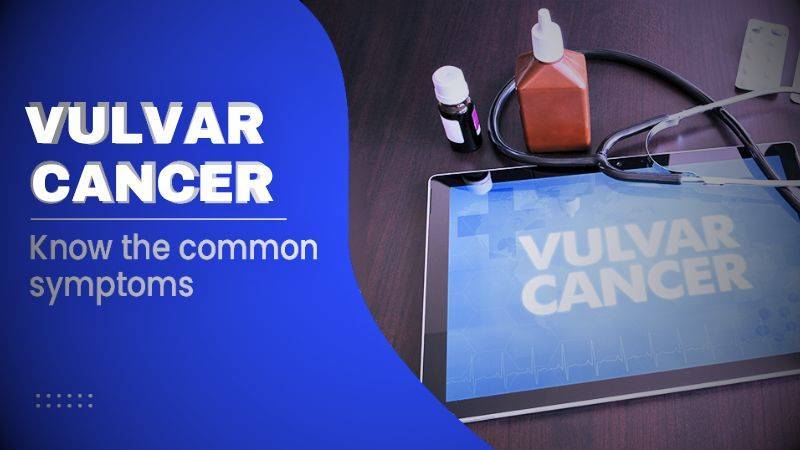Vulvar cancer, also known as vulval cancer, refers to the abnormal growth and division of cells in the vulva, which is a part of the female reproductive system. These cancerous cells can invade nearby tissues and organs, and in some cases, they can spread to other areas of the body.
What is Vulva?
The vulva refers to the external genitalia in females, located between the legs. It encompasses several structures, including the labia majora (outer lips) and the labia minora (inner lips). Between these lips, there are two openings: the vaginal entrance and the urethra, which is a short tube responsible for transporting urine from the bladder to the outside of the body.

Situated at the front of the vulva is the clitoris, a small organ that plays a vital role in sexual pleasure and climax for women. The mons pubis, a rounded area of fatty tissue, is positioned just above the pubic bone.
On either side, slightly below the vagina, there are two glands known as Bartholin’s glands. These glands produce a lubricating fluid that aids in sexual intercourse.
The anus serves as the opening to the back passage and is in proximity to the vulva but is distinct from it. The area of skin located between the vagina and the anus is referred to as the perineum.
Stage 4 Vulvar Cancer
It is the most advanced stage of vulvar cancer, indicating that the cancer has spread beyond the vulva to other areas of the body. Staging is determined through various tests, including surgery and imaging scans.
In stage 4 vulvar cancer, there are 2 substages: 4A and 4B.
Stage 4A
- The cancer is located in the vulva or perineum, and may be growing into the anus, lower vagina, or lower urethra.
- It may have spread to nearby lymph nodes, causing ulcers or attachment to underlying tissues.
- Alternatively, it may have spread to the bladder, rectum, pelvic bone, upper urethra, or vagina, with or without involvement of nearby lymph nodes. However, it has not spread to distant sites.
Stage 4B
- The cancer has spread to distant lymph nodes or organs, such as the lungs or bones.
- It may or may not have spread to nearby organs or lymph nodes.
Vulvar cancer typically develops slowly, often starting on the outer vaginal lips.
If left undiagnosed and untreated, it can spread to surrounding tissues, including the vagina, anus, urethra, lymph nodes, and other parts of the body.
Regular pelvic exams are crucial for early detection and treatment of abnormal tissues, helping reduce the risk of cancer spread.
It is important to seek medical attention if any symptoms or abnormalities are noticed in the vulvar area.
Where Does Vulva Cancer Start?
Vulval cancer can originate in any part of the female external sex organs, but it most commonly begins in the labia majora (outer lips) or the labia minora (inner lips).
The development of vulval cancer is typically a gradual process. It begins with normal cells undergoing changes and becoming abnormal. These abnormal cells may then progress to form cancerous cells.
The medical term for these abnormal cells is vulval epithelial neoplasm or VIN, which is not an indication of cancer itself but rather a precancerous condition.
Some cases of VIN may resolve without treatment, while others require intervention. Detecting these abnormal cells early and receiving appropriate treatment can prevent the progression of vulval cancer.
However, not all types of vulval cancer have a precancerous stage or VIN. If you experience any symptoms, it is important to consult your GP who can provide information on available treatments or refer you to a specialist.
Causes and Risk Factors
The causes and risk factors associated with vulval cancer include:
Human papillomavirus (HPV) infection:
Certain types of HPV can infect the vulva and increase the risk of developing vulval cancer. HPV is transmitted through skin-to-skin contact, often during sexual activity.
About 70 out of every 100 vulval cancers are caused by HPV infections, with the most common HPV types linked to vulval cancer being HPV 16, 33, and 18. Vaccination against HPV is available to help protect against HPV infections.
Weakened immune system:
Having a weakened immune system, such as in individuals with HIV (human immunodeficiency virus) or those who have undergone organ transplantation and take immunosuppressive drugs, increases the risk of vulval cancer.
Weakened immunity makes individuals more susceptible to infections, including HPV.
Lichen Sclerosus
Lichen sclerosus is a chronic vulval skin condition that causes itching and sometimes pain in the vulval area, often affecting women over the age of 60.
Women with lichen sclerosus have a higher risk of developing differentiated vulval intraepithelial neoplasia (dVIN), which can progress to vulval cancer if left untreated.
Vulval Intraepithelial Neoplasia (VIN)
VIN refers to abnormal cell growth in the surface layers of the vulvar skin. While not cancer itself, untreated VIN can progress to vulval cancer over many years.
Previous cervical cancer or cervical intraepithelial neoplasia (CIN):
Having a history of cervical cancer or precancerous changes in the cells of the cervix (CIN) increases the risk of vulval cancer. Cervical cancer and vulval cancer share similar risk factors, including HPV infection.
It’s important to note that while these factors are associated with an increased risk of vulval cancer, having one or more risk factors does not guarantee the development of the disease.
Additionally, there may be other potential causes or risk factors for vulval cancer that require further scientific evidence to establish a clear connection.
Symptoms
Some signs may indicate vulvar cancer include:
- Presence of an open sore or visible growth on the skin.
- Persistent itching in the vulva region.
- Unexplained bleeding from the vulva.
- Pain or soreness in the vulva area.
- Thickened, raised, or discolored patches of skin on the vulva, which can be red, white, or dark.
- Changes in the shape or color of an existing mole on the vulva.
- Development of a lump or swelling in the groin area.
- Experience of burning pain during urination.
If you notice any of these symptoms, it is important to consult a healthcare professional for further evaluation and appropriate diagnosis.
Keep in mind that these symptoms can also be caused by various other conditions, so a proper medical assessment is necessary to determine the underlying cause
Diagnosis
To determine if the symptoms you are experiencing could be attributed to vulval cancer, several tests are typically conducted.

If vulval cancer is confirmed, further tests are performed to determine the extent of its growth.
The tests for vulval cancer may include:
Vulval examination: A healthcare professional will visually inspect the vulva and surrounding areas to assess any abnormalities or signs of cancer.
Biopsy: A small sample of tissue is taken from the affected area of the vulva for laboratory analysis. This helps in confirming the presence of cancer cells and determining the type and stage of vulval cancer.
Scans: Imaging tests such as pelvic scans, computed tomography (CT) scans, magnetic resonance imaging (MRI) scans, or positron emission tomography (PET) scans may be conducted to evaluate the extent of cancer spread to the pelvis and other parts of the body.
It’s important to note that these tests may cause discomfort, embarrassment, or pain, which can be distressing.
Your doctor or specialist will make efforts to ensure your comfort during the process. If desired, you can request a chaperone to be present in the room during the examination. This can be a friend, family member, or a trained healthcare professional like a practice nurse or specialist nurse who can offer support and assistance.
Before any examination or test, your doctor or specialist should provide a clear explanation of the procedure. If you have any questions or uncertainties, don’t hesitate to ask them for clarification.
Treatment
The treatment for vulval cancer is determined based on various factors such as the size of the cancer, the presence of metastasis (spread) to other parts of the body, and your overall health.
A multidisciplinary team of doctors and healthcare professionals will collaborate to determine the most suitable treatment and care plan for you.
Surgery is the most common treatment approach for vulval cancer. The specific surgical procedure will depend on the extent and location of the cancer. Surgical options may include:
Local Excision: This involves removing the cancerous area and a margin of healthy tissue surrounding it.
Wide Local Excision: A larger area of tissue is removed around the cancer to ensure complete removal.
Vulvectomy: This procedure involves removing a portion or the entire vulva, including the affected tissue and nearby lymph nodes. There are different types of vulvectomy, such as a partial vulvectomy, radical vulvectomy, or simple vulvectomy, depending on the extent of the cancer.
Lymph Node Surgery: If there is evidence or suspicion of cancer spread to the lymph nodes, the nearby lymph nodes may be removed and examined for cancer cells.
In addition to surgery, other treatment modalities may be used alone or in combination:
Radiation Therapy: High-energy X-rays or other radiation sources are used to target and kill cancer cells. Radiation therapy may be used before surgery to shrink the tumor, after surgery to destroy any remaining cancer cells, or in cases where surgery is not feasible.
Chemotherapy: Anti-cancer drugs are administered to kill cancer cells throughout the body. Chemotherapy may be used in combination with radiation therapy or as the primary treatment for advanced cases of vulval cancer.
Targeted Therapy: This treatment approach uses drugs that specifically target certain genetic mutations or proteins involved in the growth of cancer cells. Targeted therapy may be used in cases where specific genetic alterations are identified in the tumor.
Palliative Care: In advanced stages of vulval cancer where a cure may not be possible, palliative care focuses on symptom management, pain relief, and improving quality of life.
The choice of treatment will be individualized based on your specific circumstances and preferences.
Your healthcare team will provide detailed information about the recommended treatments, potential side effects, and support services available to you throughout the treatment process.
Coping with Vulvar Cancer

It can be challenging both emotionally and physically. However, with the right support and strategies, it is possible to navigate through this difficult time.
Here are some suggestions for coping with vulvar cancer:
Seek emotional support: Reach out to loved ones, friends, or support groups who can provide understanding, empathy, and a listening ear.
Sharing your feelings and experiences with others who have gone through similar situations can be comforting and empowering.
Educate yourself: Learn about vulvar cancer, its treatment options, and potential side effects. Understanding the disease and its management can help alleviate anxiety and empower you to actively participate in decision-making regarding your treatment.
Communicate openly with your healthcare team: Establish a good rapport with your healthcare providers and maintain open communication. Ask questions, voice concerns, and seek clarification about your treatment plan, potential side effects, and supportive care options.
Your medical team is there to support you and provide guidance throughout your journey.
Practice self-care: Focus on self-care activities that promote physical and emotional well-being. Engage in activities that bring you joy and help you relax, such as hobbies, gentle exercises, meditation, or spending time in nature.
Prioritize rest and sleep, maintain a healthy diet, and listen to your body’s needs.
Address physical challenges: Depending on your treatment, you may experience physical changes and challenges. Work closely with your healthcare team to manage symptoms, such as pain, fatigue, or changes in sexual function.
Seek appropriate medical interventions, such as pain management techniques or physical therapy, to help alleviate discomfort and improve your quality of life.
Utilize available resources: Explore support services offered by cancer centers, such as counseling, support groups, or complementary therapies like art therapy or relaxation techniques.
These resources can provide valuable emotional support and help you develop coping strategies.
Prioritize your emotional well-being: Engage in activities that promote emotional well-being, such as mindfulness exercises, journaling, or talking to a mental health professional. Addressing and processing your emotions can help reduce anxiety and stress.
Advocate for yourself: Be an active participant in your healthcare journey. Ask questions, seek second opinions, and ensure that your needs and concerns are addressed.
Advocate for the best possible care and treatment options that align with your preferences and goals.
Remember, everyone’s journey with vulvar cancer is unique. It’s important to be patient with yourself, allow yourself to grieve and process emotions, and seek support when needed.
Reach out to your healthcare team and loved ones, and embrace self-care practices to navigate through this challenging time.
Life after Treatment for Vulvar Cancer
It involves regular follow-up appointments to monitor your recovery and address any concerns or issues that may arise. These appointments provide an opportunity for you to discuss your progress and seek support as needed.
Emotional and Psychological Aspects:
The emotional response to vulval cancer treatment varies from person to person. Dealing with changes to the vulval and genital areas can be challenging, as they are private parts of the body.
It is normal to struggle with discussing your feelings about these changes. Treatment may affect your self-confidence, and it may take time to come to terms with the physical and emotional adjustments brought about by treatment.
Initially, there may be a mix of relief and other emotions, such as fear, shock, or anger. Over time, with support from loved ones, these negative feelings usually improve.
However, if you find that negative emotions persist or if you are experiencing signs of depression, it is important to talk to your doctor or specialist nurse.
Coping with Changes in Appearance:
After surgery or radiotherapy, there will be changes in how your vulval area looks. Swelling and bruising are common immediately after surgery, but these will heal over time.
Surgery may involve the removal of inner and outer labia, resulting in a different appearance. Radiotherapy can also cause changes in the skin, such as darkening.
Accepting sudden changes to your body can be challenging and may evoke feelings of anger, confusion, and sadness. Open communication with loved ones and seeking their support can be immensely helpful during this time.
Support and Resources:
If you are struggling with the changes to your genital area or feeling less feminine, reach out to your specialist nurse or organizations that offer support for women with similar experiences.
Connecting with others who have gone through the same journey can provide validation, understanding, and a sense of belonging.
Remember to be patient with yourself as you adapt to the changes and seek support when needed. Over time, many women find ways to regain confidence and embrace their new normal.
Take Care of Yourself!






